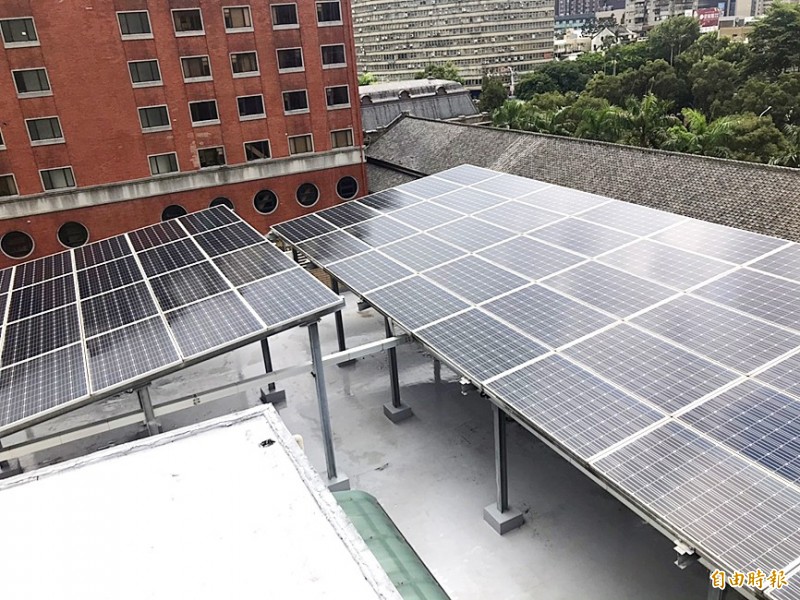《TAIPEI TIMES》 Huawei at legislature, military: report

Solar panels are pictured on the rooftop of the Legislative Yuan’s Zhengjiang House in Taipei yesterday. Photo: Peng Wan-hsin, Taipei Times
NETWORK FUNCTIONS: Using Huawei’s inverters could create a security loophole, allowing Chinese hackers to meddle with Taiwan’s power supply, sources said
By Peng Wan-hsin and Dennis Xie / Staff reporter, with staff writer
A Republic of China (ROC) Military Academy project to install solar panels on its campus has reportedly been subcontracted to a company that is affiliated with China’s Huawei Technologies Co (華為), which was also found to have installed solar panels atop a building at the Legislative Yuan in Taipei, sparking concern over national security.
While the US and several European countries, as well as public agencies in Taiwan, have banned Huawei due to data security risks, the Chinese-language Apple Daily yesterday reported that it had received an anonymous tip that a construction project at the military academy in Kaohsiung has been subcontracted to New Green Power Co (永鑫能源), a distributor of power inverters manufactured by Huawei.
Although public bidding on the project in July last year was won by Cheng Yang Energy Co (承陽能源), it outsourced the project to New Green Power, sources said.
The report also said that arrays of solar panels on top of the Legislative Yuan’s Zhenjiang House (鎮江會館) on Zhenjiang Street are connected to an array of power inverters bearing “Green Power Co” and “Made in China” labels, as well as Huawei’s logo.
As power inverters have network functions, using Huawei’s inverters could allow Chinese hackers to interfere with Taiwan’s power supply, given that the rooftop solar panels would be connected to the grids owned by state-run Taiwan Power Co (Taipower, 台電), the nation’s sole electric utility, the sources said.
Changing the transmission frequency of the power inverters could disrupt the electricity grids, sending them into safety mode and triggering blackouts, they said.
Huawei devices might have backdoor software that transmits data — including on power generation and consumption — from power grids in Taiwan to China, lawmakers said.
Huawei is not just any Chinese company, but one with links to the Chinese People’s Liberation Army, so blocking the products is necessary against the backdrop of Chinese expansionism, not due to resentment against China, they said.
In response to lawmakers’ concerns, the Bureau of Energy and the Bureau of Standards, Metrology and Inspection agreed that Huawei products pose a data security risk, adding that the government would close any loopholes in regulations on the use of solar inverters at public facilities.
The Executive Yuan has demanded that all public entities comply with the Government Procurement Act (政府採購法), which states that products that could undermine national cybersecurity are banned, said a senior Cabinet official, who declined to be named.
No central government departments or agencies are using Huawei products, the source added.
The academy yesterday said that no contractors had come to the campus to carry out work, which is pending approval by the Kaohsiung City Government.
It would comply with the government’s information safety rules and not use Chinese products, it said.
Legislative Yuan Secretary-General Lin Chih-chia (林志嘉) yesterday said that he had ordered that the power inverters be promptly torn down, adding that Huawei products are strictly prohibited.
Additional reporting by CNA
新聞來源:TAIPEI TIMES















